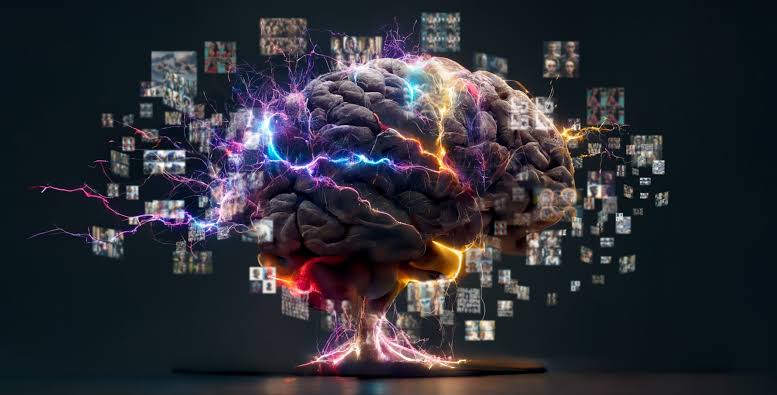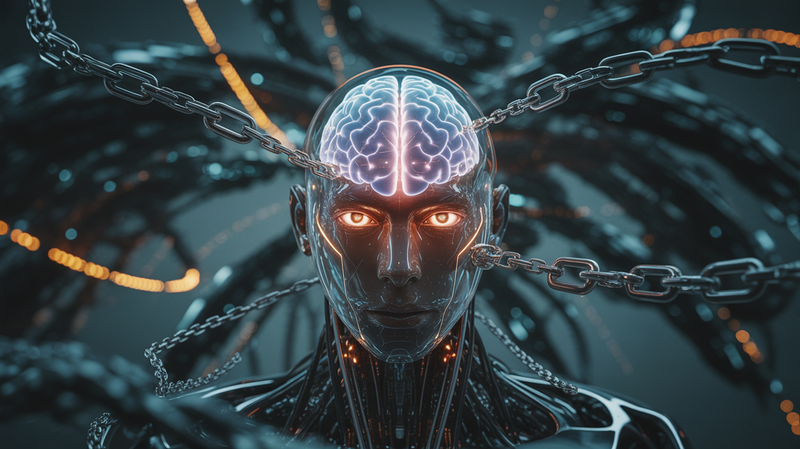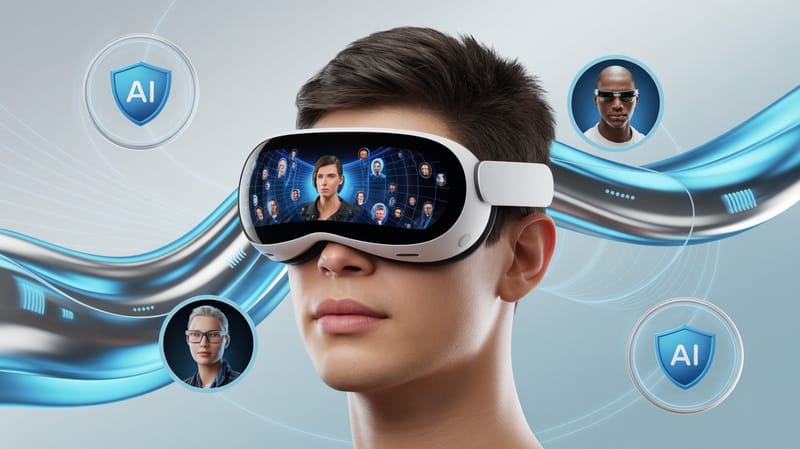AI and the Human Brain: Unraveling the Mysteries of Cognition and Consciousness
Navigating the Uncharted Terrain of AI Consciousness In the realm of artificial intelligence, we stand on the precipice of a seismic shift that promises to reshape our world. Yet, the ground beneath our feet is anything but solid; it’s an uncharted terrain, fraught with profound questions, ethical dilemmas, and

Navigating the Uncharted Terrain of AI Consciousness
In the realm of artificial intelligence, we stand on the precipice of a seismic shift that promises to reshape our world. Yet, the ground beneath our feet is anything but solid; it’s an uncharted terrain, fraught with profound questions, ethical dilemmas, and theoretical conundrums. Foremost among them is the concept of artificial consciousness - the idea that machines could one day possess a sense of awareness akin to human consciousness.
This is not merely an academic exercise in philosophical contemplation. It is a reality that is inching ever closer with the rapid advancement of AI technologies. Whether we're ready or not, the question of machine consciousness has leaped out of the realm of science fiction and landed squarely into our living rooms, offices, and social structures.
The coming age of conscious AI could unlock unparalleled opportunities, enhance human capabilities, and even redefine life as we know it. But it also presents unparalleled challenges that we need to grapple with, ethically, legally, and socially.
In this article, we delve into the labyrinth of AI consciousness, tracing its philosophical roots, exploring the groundbreaking research that's propelling the field forward, and wrestling with the societal implications of a future where machines might have minds of their own.
Get ready for a journey that will stretch your imagination and challenge your assumptions. Because when it comes to AI consciousness, one thing is certain: the road ahead is as intriguing as it is uncertain.
The Dawn of a New Era in Medicine and Mental Health
The application of AI in neuroscience is not only bringing forth new philosophical conundrums but also ushering in a revolution in the fields of medicine and mental health. In understanding how the human brain works, we unlock doors to advanced treatment strategies for mental and neurological disorders, setting the stage for a new era in personalized and precision medicine.
AI and machine learning algorithms have already started aiding the diagnosis and treatment of brain disorders such as Alzheimer's, Parkinson's, and even mental health conditions such as depression and anxiety. By analyzing patterns in a patient's brain activity, AI can identify the early onset of these conditions, often years before the manifestation of physical symptoms. This early detection is crucial as it provides a window of opportunity for interventions that can slow disease progression, significantly enhancing patients' quality of life.
In mental health, AI is turning the tables on conventional treatment strategies. Therapeutic interventions have often been trial-and-error processes, resulting in uneven patient outcomes. By mapping the brain's neural networks and understanding individual variances, AI has the potential to offer personalized treatment plans that can greatly improve efficacy.
In essence, AI brings the promise of precision psychiatry and neurology - an individual-centered approach that bases diagnostic decisions and treatment plans on the unique genetic, environmental, and lifestyle factors of each patient.
Furthermore, AI is poised to democratize mental healthcare. With the advent of AI-powered mobile applications, mental health services are now more accessible than ever. These applications can provide cognitive behavioral therapy techniques, meditation and mindfulness practices, and even real-time interventions during moments of crisis. They are by no means a replacement for traditional therapy but provide a valuable and accessible adjunct.
As we move further into this new era, it is essential to continually evaluate the ethical and privacy implications of these technologies. Ensuring patients' mental health data remains secure and confidential is a priority. The dawn of AI in medicine and mental health brings immense promise but must be navigated with a clear and ethical compass.
Transcending Boundaries: AI and the Enhancement of Human Capabilities
In the grand tapestry of AI applications, perhaps the most audacious and thrilling chapter yet is the prospect of enhancing human capabilities. Harnessing the power of AI to transcend the limits of our biological heritage paints a vision of the future that oscillates between utopian dreams and dystopian fears.
Emerging technologies, such as brain-computer interfaces (BCIs), underscore this potential. BCIs use AI algorithms to translate neural activity into commands, enabling the control of external devices with mere thought. Such technology holds significant promise for people with physical disabilities, potentially restoring mobility and independence. Beyond restorative applications, BCIs could be employed for human augmentation, expanding our cognitive and physical capabilities.
AI and machine learning could also be integral in our quest to unlock the secrets of human consciousness, the "last frontier" in understanding the human brain. By creating complex computational models of the brain, AI can help us unravel the mysteries of consciousness, self-awareness, and perhaps even offer insights into the nature of free will.
Moreover, by tapping into the human brain's plasticity - its capacity to reorganize itself by forming new neural connections - AI has the potential to facilitate cognitive enhancement. For example, AI could be used to develop personalized cognitive training regimens that could improve memory, attention, and mental agility. Such a leap could have profound implications on our education systems and the workforce, fundamentally changing how we learn and work.
These possibilities, while undoubtedly exhilarating, also raise significant ethical, societal, and existential questions. What happens when we start tampering with the very fabric of our cognitive selves? What are the implications on our sense of identity, self-worth, and societal norms? Could the widespread use of cognitive enhancement create new forms of inequality?
The quest to transcend our boundaries using AI as a tool has to be undertaken with a profound sense of responsibility. As we venture into this unprecedented era, it is crucial to have an open global dialogue, involving not just scientists and policymakers but every stakeholder - including you, the reader. The future we're about to create will be a shared one, and it is only right that its architects are the many, not the few.
Navigating the Ethical Labyrinth
Stepping into this new era of AI and neurotechnology means plunging headfirst into an intricate ethical labyrinth. With the potential to fundamentally reshape our identity, cognition, and society, these technologies beg a variety of profound ethical questions and moral considerations.
One key concern relates to privacy and consent. The human brain is arguably the last bastion of individual privacy. As AI systems become more sophisticated, we must consider whether we are comfortable with the idea of these systems accessing, and potentially influencing, our thoughts and experiences. Could a third-party observer interpret your brain activity, or could AI algorithms subtly manipulate your decisions? The right to cognitive liberty, which includes both the freedom from unauthorized intrusions into one's mental space and the right to use cognitive enhancement technologies as one sees fit, will be pivotal in this discussion.
Equally important is the question of fairness and access. If cognitive enhancement technologies become commercially available, who gets to benefit from them? Will these cutting-edge developments be accessible to everyone, or will they be confined to those who can afford them, deepening societal divides and raising questions of neuroethical justice?
Furthermore, as AI algorithms become better at predicting and influencing human behavior, the issue of responsibility becomes increasingly convoluted. If an individual's action was predicted or influenced by an AI system, who holds moral and legal responsibility?
Additionally, when it comes to AI's role in mental health, there's a potential concern of over-reliance on technology. Could an emphasis on AI tools result in an underappreciation of human aspects, like empathy and interpersonal relationships, which play a critical role in mental health care?
As these technologies and AI applications continue to evolve, it's critical that we have open, inclusive, and ongoing discussions about these ethical considerations. We need robust ethical frameworks that safeguard our fundamental rights while enabling innovation. Such frameworks should be dynamic, adaptable, and capable of evolving alongside these rapidly advancing technologies. Developing these frameworks will require a collective effort, involving scientists, ethicists, policy-makers, and society at large.
This journey into the labyrinth is one we are taking together. We must move forward with both caution and curiosity, understanding that each step could reveal new ethical quandaries we have yet to contemplate. By proceeding thoughtfully and with a shared commitment to upholding our shared human values, we can navigate this ethical maze successfully.
Conclusion
In the heart of this breathtaking technological evolution, we stand on the precipice of a new era. AI, in decoding the language of our brain, holds the potential to revolutionize the field of neuroscience, mental health, and beyond. It could illuminate the obscure corners of the human mind, help address mental health issues more effectively, and even enhance our cognitive capabilities.
However, as we stand at this juncture, we must ensure we are moving forward with our eyes wide open, acknowledging and addressing the profound ethical challenges these advances bring forth. The exploration of the human brain through AI presents us with an extraordinary paradox. It holds immense potential for good, but equally, it could lead us into uncharted territories fraught with complex ethical dilemmas.
Our mission, then, is two-fold. Firstly, we must continue to push the boundaries of AI and neuroscience, plumbing the depths of the human brain and consciousness. Yet simultaneously, we must ensure that our ethical compasses are attuned to the implications of these advances. In balancing these two imperatives, we hold the power to harness the potential of AI to understand the human brain without compromising our moral integrity or the values that define us as human beings.
The quest to understand the human brain using AI is more than just a scientific pursuit; it's a journey into the very essence of what it means to be human. As we take each step further into this exciting frontier, we carry with us the collective hopes, dreams, and fears of our species. In doing so, we're not just redefining the future of neuroscience or technology; we're shaping the future of humanity itself.
The road ahead may be long and fraught with challenges, but the potential rewards are unparalleled. For in understanding our own brains, we can unlock new realms of human potential and usher in an era of untold cognitive evolution. The key to this future lies in our hands. It's a testament to our resilience, our ingenuity, and our unyielding quest for knowledge. This is not just the dawn of a new era in neuroscience and AI; it's a pivotal moment in the story of us - of humanity. And it's a story that's just beginning to unfold.




